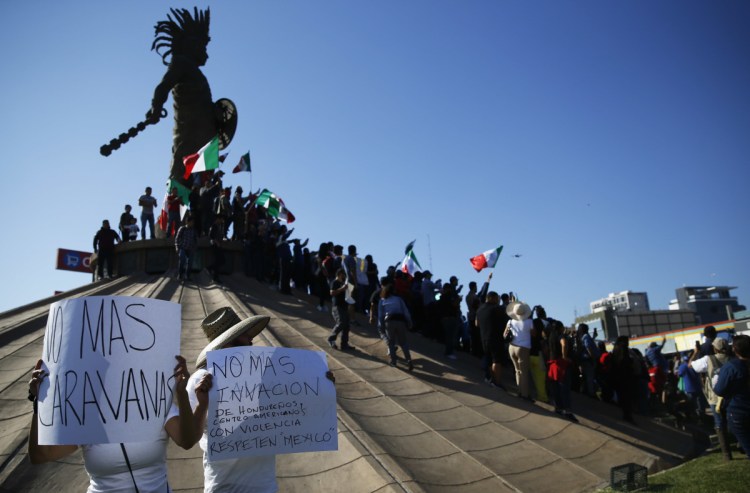TIJUANA, Mexico — Hundreds of Tijuana residents congregated around a monument in an affluent section of the city south of California on Sunday to protest the thousands of Central American migrants who have arrived via caravan in hopes of a new life in the U.S.
Tensions have built as nearly 3,000 migrants from the caravan poured into Tijuana in recent days after more than a month on the road, and with many more months ahead of them while they seek asylum. The federal government estimates the number of migrants could soon swell to 10,000.
U.S. border inspectors are processing only about 100 asylum claims a day at Tijuana’s main crossing to San Diego. Asylum seekers register their names in a tattered notebook managed by migrants themselves that had more than 3,000 names even before the caravan arrived.
On Sunday, displeased Tijuana residents waved Mexican flags, sang the Mexican national anthem and chanted “Out! Out!” in front of a statue of the Aztec ruler Cuauhtemoc, 1 mile from the U.S. border. They accused the migrants of being messy, ungrateful and a danger to Tijuana. They also complained about how the caravan forced its way into Mexico, calling it an “invasion.” And they voiced worries that their taxes might be spent to care for the group.
“We don’t want them in Tijuana,” protesters shouted.
A woman who gave her name as Paloma lambasted the migrants, who she said came to Mexico in search of handouts. “Let their government take care of them,” she told video reporters covering the protest.
Most of the migrants who have reached Tijuana via caravan in recent days set out more than a month ago from Honduras, a country of 9 million people. Dozens of migrants in the caravan who have been interviewed by Associated Press reporters have said they left their country after death threats.
The migrants’ expected long stay in Tijuana has raised concerns about the ability of the border city of more than 1.6 million people to handle the influx.
While many in Tijuana are sympathetic to the migrants’ plight and trying to assist, some locals have shouted insults, hurled rocks and thrown punches at them. The cold reception contrasts with the warmth that accompanied the migrants in southern Mexico, where residents of small towns greeted them with hot food, campsites and live music.
Copy the Story LinkSend questions/comments to the editors.



Success. Please wait for the page to reload. If the page does not reload within 5 seconds, please refresh the page.
Enter your email and password to access comments.
Hi, to comment on stories you must . This profile is in addition to your subscription and website login.
Already have a commenting profile? .
Invalid username/password.
Please check your email to confirm and complete your registration.
Only subscribers are eligible to post comments. Please subscribe or login first for digital access. Here’s why.
Use the form below to reset your password. When you've submitted your account email, we will send an email with a reset code.